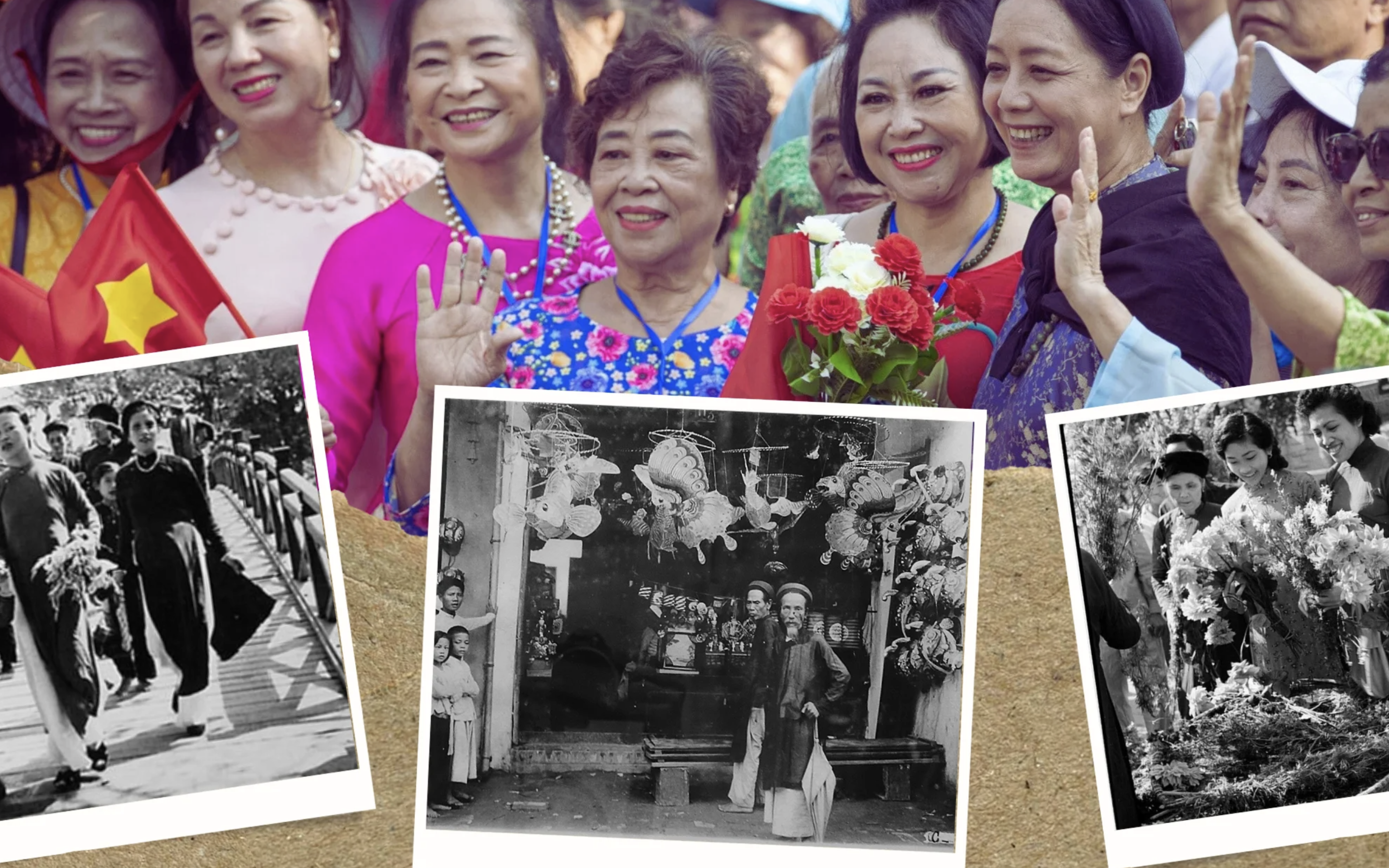



When discussing the lifestyle of Hanoians , many people often quote the saying: “Even if it is not fragrant, it is still jasmine/ Even if it is not elegant, it is still a person of Trang An”. Some cultural researchers believe that this saying is the “muou” line in the song “Thanh Thang Long” by Nguyen Cong Tru (1778-1858). But there is another opinion, this saying is a folk song of Thang Long land and Nguyen Cong Tru included it in “Thanh Thang Long”.
Many people also quote the saying: "A refined person's voice is also refined/Even a bell rung softly by the wall also rings" or quote the folk song of Lang village "Thanks to the refined person carrying the vegetables to the capital". Lang is a village on the banks of the To Lich River, west of the capital Thang Long, famous for growing vegetables. Because the people of the capital are refined, the Lang people carrying vegetables to sell must also be refined.
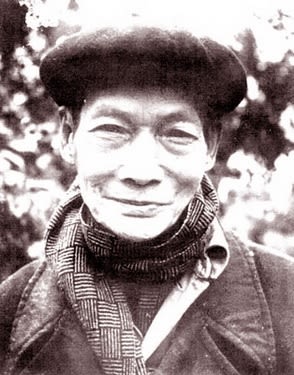
Hanoi Cultural House Hoang Dao Thuy.
Culturalist Hoang Dao Thuy (1900-1994) was from Lu village on the To Lich river but was born on Hang Dao street. He was the author of many books on history, culture, and social life in Hanoi before 1954, including the book "Elegant Hanoi" published in 1991. He had to do in-depth research to name the book like that. Elegance, subtlety, and grace are cultural lifestyles. This lifestyle has transcended instincts and reached rationality, meaning being conscious, conscious of oneself and the community.
In Samuel Baron's book "Description of the Kingdom of Tonqueen" (Published in 1683), there is a passage about the men of Thang Long: "It is rare to see them drinking wine with red faces on the street or lying around drunk." When visiting the sick, they do not ask directly: "How is your illness?" but very delicately: "How many bowls of rice have you eaten recently." Baron's father is Dutch, his mother is from Thang Long. He lived in Thang Long for several decades, and worked for a long time for the British East India Company.
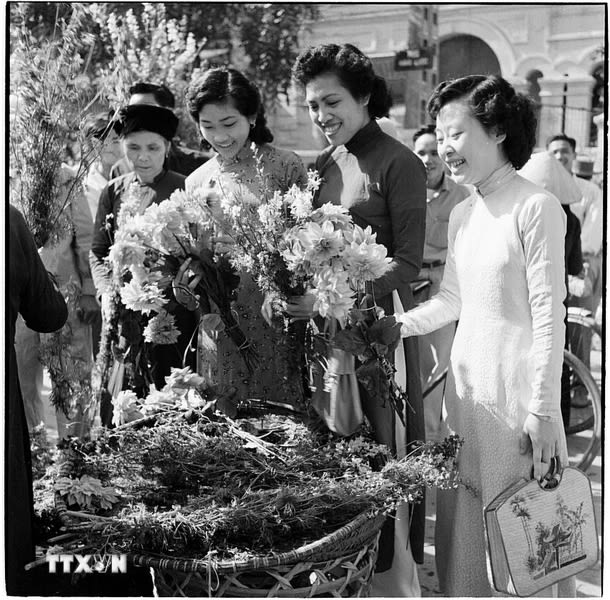
Young women in Hanoi go to the flower market on the occasion of the Lunar New Year in 1959. (Photo: VNA)
Thang Long was the capital for about 800 years, from the Ly to Le dynasties with a small area and a small population. In the capital there were kings, mandarins, soldiers and only a small part of the population worked in agriculture , the majority were in trade, services, and handicraft production. Every day on the street, they met mandarins and soldiers, so they were careful and discreet in their words to avoid trouble. The discreet lifestyle also affected women's clothing.
The book “In Tonkin” (Au Tonkin) is a collection of articles that Paul Bonnetain, a reporter for “Le Figaro” newspaper, wrote about Tonkin and Hanoi in the late 19th century. In the article “Walking through Hanoi” he described the way women dressed: “We saw women wearing dull colored robes on the outside, but inside many of them wore very discreet ao dai, we counted up to ten bright colors”.
Jerome Richard was an English priest who lived in Thang Long for 18 years. He wrote "Natural, civil and political history of the Dang Ngoai region", published in 1778 (Histoire naturelle civile et politique du Tonkin).
Regarding the lifestyle in the capital Thang Long, he wrote: “following strict and orderly rituals” while outside the capital it was “more relaxed”. Unlike the villages far from the center of power where “the king’s law is weaker than the village’s customs”, the people of Thang Long “feel the heat of the fire”.
Since the Ly Dynasty, there were gold and silver shops, metal farming tool manufacturing shops, and the royal court had a Bach Tac workshop that produced consumer goods to serve the royal court's administrative apparatus.
Thang Long is also called Ke Cho. The business is entirely undertaken by women. To sell their goods, they speak skillfully but not falsely, gently but convincingly, creating trust for customers. Lifestyle does not come naturally, according to the progress of society, it is subject to the regulation of laws, royal decrees, religions, beliefs... Mandatory adjustments gradually become customs, creating ethical standards for the community and society. However, Thang Long people are aware that living in the upper capital is a source of pride, so they themselves change.
Some people think that elegant lifestyle only existed in the feudal intellectual class, this is not true, most of the people who passed the exams in the provinces went to Thang Long to become mandarins, and these mandarins were "Thang Longized" by the lifestyle.
Jerome Richard told about the meal he was invited to by a wealthy man in the capital as follows: “The host was very polite and hospitable, smiling politely at me at the door. He served me pork sausage, which was cut very evenly, showing meticulousness and fairness. After eating, the host gave me a white towel to wipe my mouth and a basin of warm water to wash my hands.”
Thang Long is the capital. Since 1976 until now, it has been the capital of the Socialist Republic of Vietnam. The capital is the political center, economic and cultural center, so the lifestyle is different from people in agricultural regions.

In “Dai Nam Thuc Luc”, the official history of the Nguyen Dynasty, the “Fourth Period” recorded King Tu Duc’s words about the lifestyle of Hanoi people. It can be summarized in 6 words: “Arrogant, luxurious, generous”. Tu Duc was an intelligent king with extensive knowledge, and reigned the longest among the Nguyen Dynasty kings (1848-1883), so his assessment is trustworthy.
Pride is to respect justice, hate evil, not to compete, within pride there is chivalry. During the Nguyen Dynasty, there were people from Hanoi who passed the exams to become mandarins, but there were also many scholars with the "Le-worshiping" ideology who refused to sit "at the same table" with the Nguyen Dynasty.
Following Chu Van An’s example, they returned to the city to open schools, such as the scholars: Le Dinh Dien, Vu Thach, Nguyen Huy Duc… Nguyen Sieu passed the vice-presidency exam and served as an official for a while, but was tired of the officialdom of bowing and seeking fame and fortune, so he retired to open Phuong Dinh school. The scholars taught their students knowledge, especially the personality of intellectuals in the transitional period. Looking back at history, few people from the old city became officials, and even fewer were high-ranking officials.
Not only are men generous and compassionate, but so are the women of Thang Long-Hanoi. An old folk song of Hanoi has the saying: "Dong Thanh is your mother and father/If you are hungry and lack clothes, go to Dong Thanh". Dong Thanh market has existed since the Ly dynasty. In years of natural disasters and crop failures, people from poor areas flocked to Thang Long. They went to the market and were given food and money by traders and market goers.
During the reign of King Tu Duc, Mrs. Le Thi Mai built a house for students from the provinces to stay for free. She also provided rice, paper and pens for poor students; the king bestowed upon her the title “Thien tuc kha phong”. In 1927, a number of sisters formed the “Nu tai tu” drama troupe to perform the play “Trang tu co bon” at the Opera House to raise money to support people in the northern provinces affected by floods. Mrs. Ca Moc (aka Hoang Thi Uyen) opened a free kindergarten. When the dike broke, she called on businesswomen in the streets to contribute and asked young people to take it to the relief work. She also established a nursing home for the elderly without a place to live. Moved by her kindness, in 1946, President Ho Chi Minh invited her to the Northern Government Palace for tea and hoped that she would continue to care for the poor.

Being sophisticated in business and sophisticated in entertainment is also a unique trait of Hanoians. During the Le Dynasty, Vong Thi village grew flowers, so it was called "Vong Thi flower field". Coming here, one could not only enjoy the flowers but also drink the famous lotus wine of Thuy Khue village, enjoy Ca Tru and reward the singers with heart-stopping songs. The book "Vu Trung Tuy But" by Confucian scholar Pham Dinh Ho (1768-1839) is a record of Thang Long society during the period when "King Le and Lord Trinh" fought for power at the end of the 18th century.
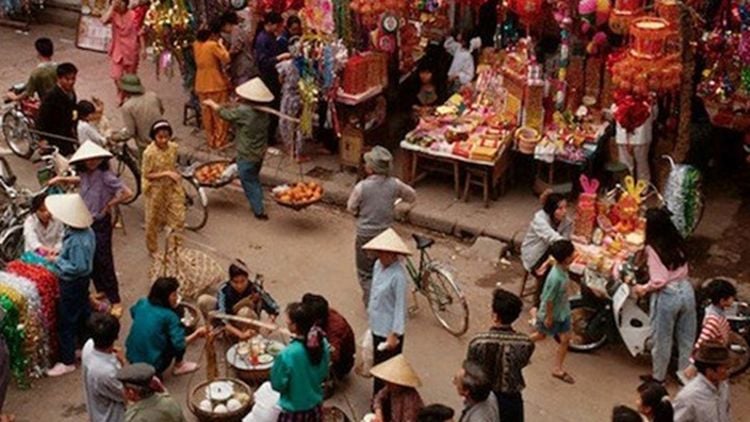
Tet market in old Hanoi.
Pham Dinh Ho pointed out the evils of the mandarins in the court, praising the lifestyle of knowing how to eat, how to play, and how to behave of the people of Thang Long. About the hobby of playing with flowers, he wrote: “Playing with flowers for the people of Thang Long is not just a normal thing, but using flowers and ornamental plants to express human morality, in other words, just by looking at the people who play with flowers, we can know their morality. In the way of playing, there is still the idea of worldly teachings and natural relationships. Therefore, we borrow flower bushes and rocks to entrust noble ambitions.”
In the 1930s, Hanoi girls initiated a modern lifestyle. They did not part their hair in the middle to appear formal, but instead combed their bangs to the side, wore shorts, wore swimsuits to swim at Quang Ba swimming pool, learned French and wrote diaries. Although it was a new lifestyle, modernity was essentially a movement of resistance against the harshness and cruelty of the old society towards women.
The modern movement of women in Hanoi was the first to demand gender equality in Vietnam and Southeast Asia. It was natural for them to buy many luxury items because Thang Long-Hanoi had a middle class, luxury was also a form of showing off status or influenced by the idiom "Many money for thousands of years/With little money, you can start again and go".
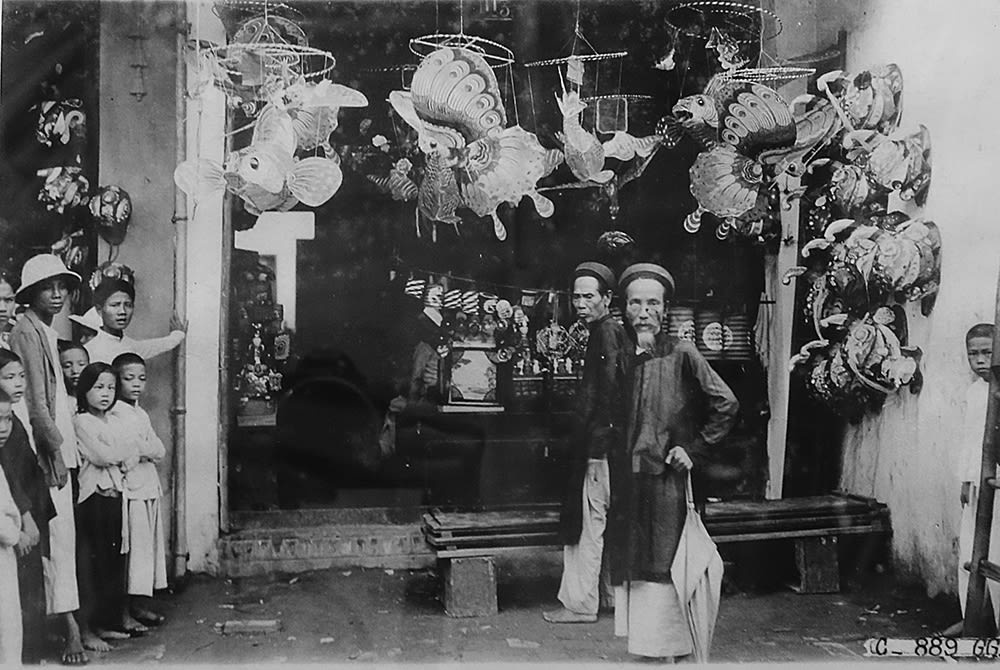
Hang Gai Street sells toys on the 15th day of the 8th lunar month in 1926. (Photo: Vietnam Academy of Social Sciences)
Thang Long is a place where four directions converge, people of later generations follow the lifestyle of the previous generation. Some people believe that French civilization and culture gave birth to elegance. It cannot be denied that foreign culture has influenced lifestyle, but it only makes elegance more profound. Lifestyle, behavior, and character are not immutable values, they change to suit the economy and society of Hanoi today, but they change on the inherent character.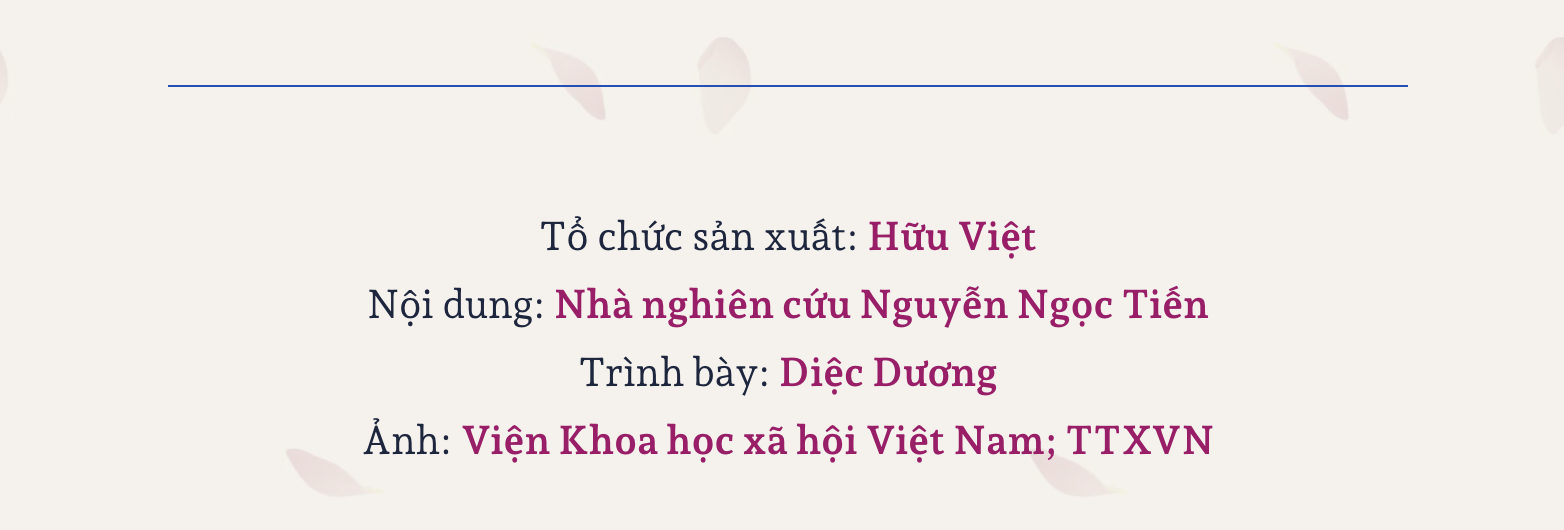
Nhandan.vn
Source: https://special.nhandan.vn/cot-cach-nguoi-Thang-Long-Ha-Noi/index.html



![[Photo] Binh Trieu 1 Bridge has been completed, raised by 1.1m, and will open to traffic at the end of November.](https://vphoto.vietnam.vn/thumb/1200x675/vietnam/resource/IMAGE/2025/10/2/a6549e2a3b5848a1ba76a1ded6141fae)



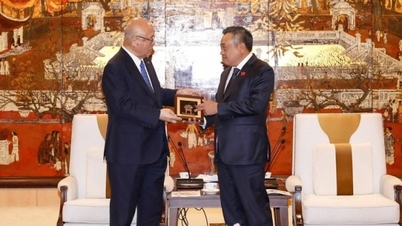




















![[Video] Improving the efficiency of state budget management and operation in the last months of the year](https://vphoto.vietnam.vn/thumb/402x226/vietnam/resource/IMAGE/2025/10/2/3e9f9151f35949f5ac5df32d01c56261)
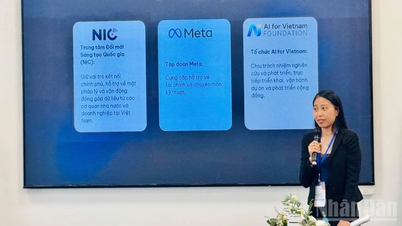
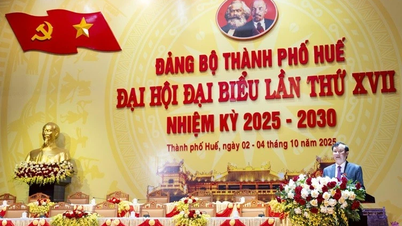
![[Video] Ministry of Health issues document to rectify medical examination and treatment work](https://vphoto.vietnam.vn/thumb/402x226/vietnam/resource/IMAGE/2025/10/2/54913f30a9934e18bcbb246c2c85f11d)
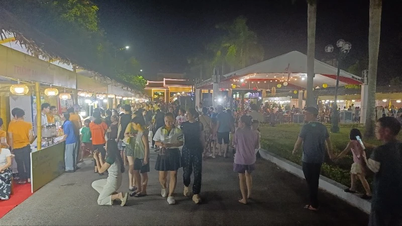
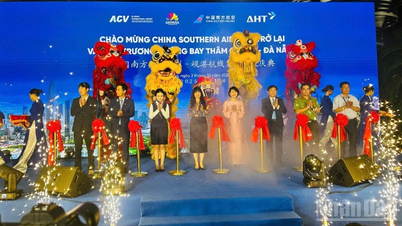















































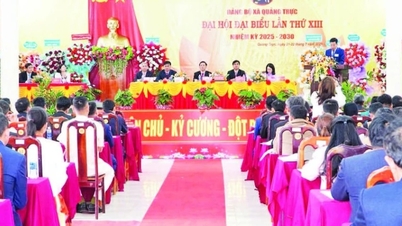

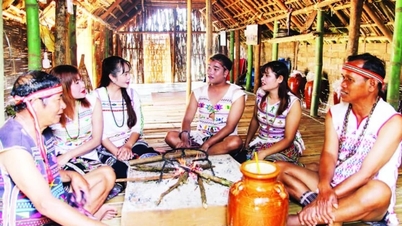

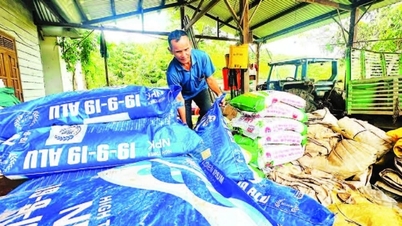
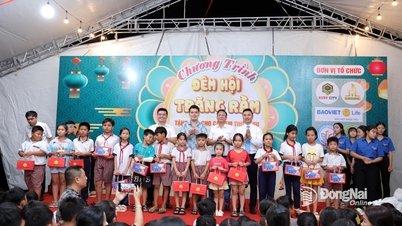














Comment (0)